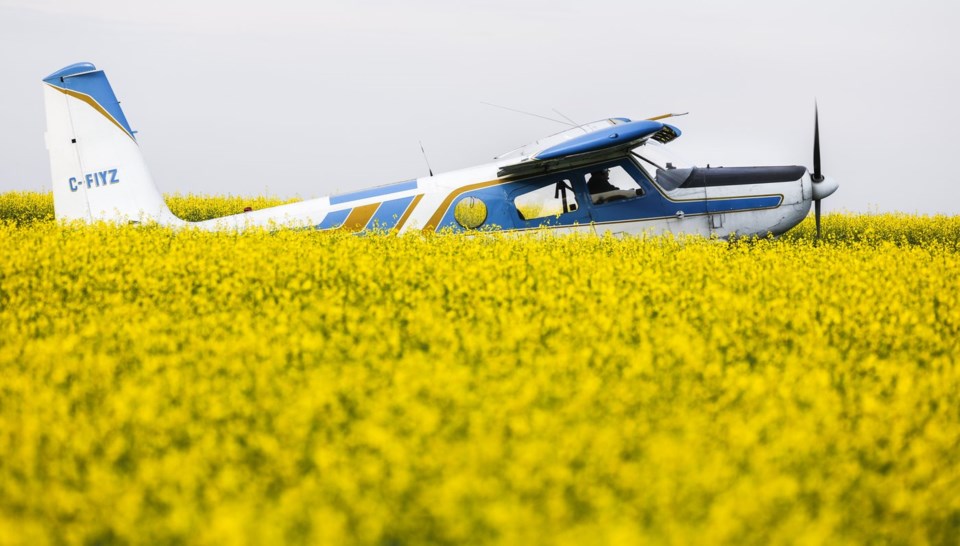REGINA — Prime Minister Mark Carney says he's considering measures to support farmers hit by a steep Chinese tariff on canola seed that came into force Thursday.
Carney said on social media that he spoke with Saskatchewan Premier Scott Moe, and they agreed to continue talking with agriculture groups about possible options. He provided no details on a plan.
The duty of nearly 76 per cent, announced Tuesday, has already caused the price of one of Canada's most valuable crops to fall, wiping out millions of dollars in its value.
"If maintained, these unjustified duties will have significant impacts on many Canadian farmers," Carney said.
"Premier Moe and I focused on a series of measures to support hard-working farmers who provide world-class food to Canadians and our trading partners throughout the world."
The tariff comes one year after China launched an anti-dumping investigation into Canadian canola. It was in response to Canada's 100 per cent tariff on Chinese electric vehicles.
The two countries have since slapped each other with various levies.
Last year, Ottawa imposed its tariff on Chinese-made electric vehicles and 25 per cent tariffs on Chinese steel and aluminum. Beijing retaliated with 100 per cent tariffs on Canadian canola meal and oil.
China's latest move on canola seed means all canola products face levies.
Earlier Thursday, federal Conservative Leader Pierre Poilievre repeated his call for Carney to cancel a $1-billion federal loan given to BC Ferries, which is purchasing Chinese-made ships.
"That is crazy at a time when they're targeting our farmers," he said.
Poilievre also accused Carney of not caring about western Canadian producers and of showing weak leadership when it comes to signing new trade deals.
"(Carney) is all talk and no action. Things are not different; they are getting worse."
Carney failed to meet a self-imposed deadline to get a new trade deal with U.S. President Donald Trump but has said officials from both countries are still working together.
The international trade ministry said in a statement the government "will always protect our Canadian farmers and producers, their families and the jobs they support."
The ministry also said Canada recently concluded a trade agreement with Ecuador and is close to finishing negotiations with the United Arab Emirates.
Agriculture Minister Heath MacDonald and International Trade Minister Maninder Sidhu have said they remain ready to speak constructively with Chinese officials to address trade concerns.
Carney also said Thursday that Canada will advance conversations with China, while aiming to expand exports to other countries.
"Canada does not dump canola. Canadian canola products meet the highest standards, and our inspection systems are robust," he said.
Farmers have also rejected claims of dumping, arguing exporters have followed rules-based trade. They've called on Ottawa to resolve the issue by speaking constructively with Chinese officials.
In a letter to Carney, Saskatchewan Opposition NDP Leader Carla Beck urges the prime minister to organize a trade mission to China with premiers.
“New tariffs on canola seed are a serious threat to Saskatchewan and require urgent action and attention by your government," Beck writes.
Beck also asks Carney to consider removing the tariffs on Chinese electric vehicles as a conciliatory measure to end the canola tariffs.
On Wednesday, Manitoba Premier Wab Kinew said Ottawa should use the revenues from its tariffs on Chinese EVs to support canola producers.
He also suggested Canada has collected $100 million in such tariffs, while China's move has wiped out $1 billion in canola values.
Moe and the Canadian Canola Growers Association have both said the industry contributes more than $43 billion to the country’s economy and employs roughly 200,000 people.
The association says China is the largest export market for Canadian canola seed, taking up about 67 per cent of Canada’s shipments, worth billions of dollars.
This report by The Canadian Press was first published Aug. 14, 2025.
Jeremy Simes, The Canadian Press




